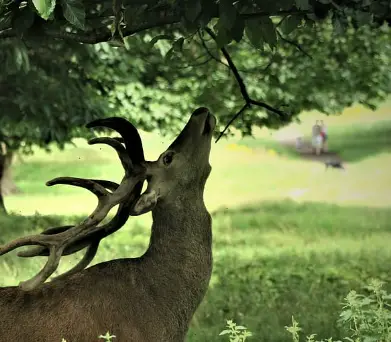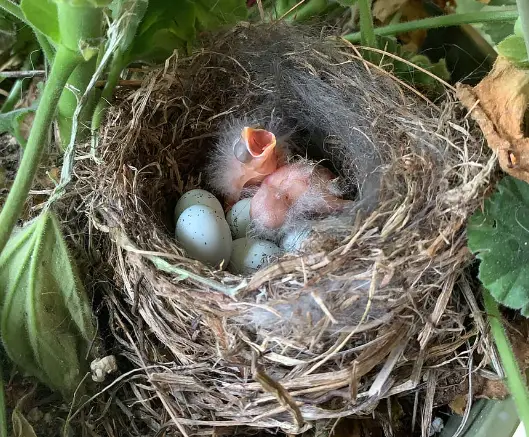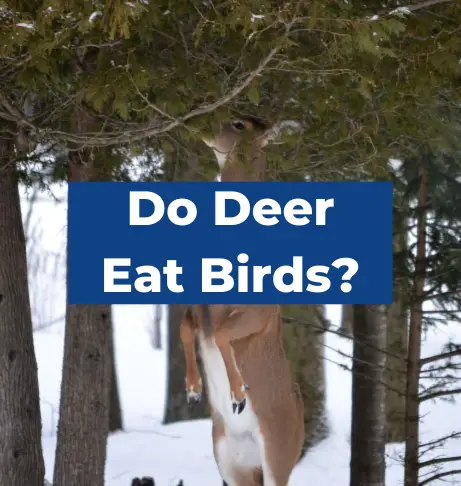Deer are often thought of as herbivores, grazing on plants in meadows and forests. But recent studies and observations have shown that deer are not strictly vegetarians and will sometimes eat birds.
Scientists have documented deer eating birds opportunistically, with some deer even consuming eggs and baby birds when they come across them. While this behavior is not common, it does occur under certain circumstances. Factors such as the availability of alternative food sources, the size and age of the deer, and the habitat they live in can all play a role in whether or not deer will eat birds.
Despite the surprising nature of this behavior, it is important to remember that deer are still primarily herbivores. Their diet consists mainly of vegetation, and they play an important role in maintaining ecosystems by controlling plant growth. The fact that deer will occasionally eat birds highlights the complex and often unpredictable nature of wildlife behavior.
Do Deer Eat Birds?

Deer are generally known as herbivores that feed on plants, leaves, fruits, and vegetables. However, there have been instances where deer have been observed eating birds. This section will explore the topic of whether deer eat birds or not.
Deer’s Diet
Deer have a digestive system designed to break down cellulose, which is present in plant matter. They typically feed on a variety of plants, including grasses, leaves, acorns, nuts, seeds, fruits, and vegetables. They may also eat insects and carrion occasionally.
Birds as Prey
While deer are not considered predators, they have been known to eat small animals, including birds. Scientists in North Dakota studying songbirds through “nest cams” found that deer opportunistically eat songbird chicks. A biologist in Scotland also documented red deer eating seabird chicks, concluding that it was how they got the dietary boost necessary to grow their antlers.
Deer and Birds’ Nests
Deer can accidentally harm birds by stepping on their nests or disturbing their habitat while foraging for food. However, they may also raid nests intentionally for an easy meal. Ground-nesting birds such as sparrows and finches are particularly vulnerable to deer predation.
Check out this nest cam footage of a deer eating a bird egg:
Preventing Deer from Eating Birds
If you want to prevent deer from eating birds in your yard, there are several things you can do. Planting deer-resistant plants, shrubs, and flowers can discourage deer from foraging in your yard. You can also try using deer repellents or installing physical barriers such as fences or netting to protect bird nests.
In conclusion, while deer are primarily herbivores, they may consume small birds or their eggs in certain circumstances. Whether or not deer will eat birds depends on several factors, including the availability of alternative food sources and the size and age of the deer. While it may seem unusual for deer to eat birds, it is not unheard of.
Deer Behavior
Deer are known for their herbivorous diet, but they have been observed eating birds and their eggs opportunistically. This behavior is not driven by hunger, but rather by instinct and availability. Deer are known to be opportunistic foragers and will eat whatever is available to them.
Deer and Wildlife

Deer are known to have a significant impact on their habitat and the wildlife that lives within it. Their browsing behavior can have a significant impact on the vegetation in the area, which can affect the availability of food and shelter for other animals. In some cases, deer can even cause the extinction of certain plant species.
Deer play an important role in the ecosystem by providing food for predators such as wolves and coyotes. They also help to disperse seeds and nutrients throughout their habitat through their browsing behavior.
Deer are also known to travel long distances in search of food and suitable habitat. This behavior can help to maintain genetic diversity within their population and prevent inbreeding.
In conclusion, while deer are primarily herbivores, they have been known to eat birds and their eggs opportunistically. Their browsing behavior can have a significant impact on their habitat and the wildlife that lives within it, but they also play an important role in the ecosystem.
Check out our other deer feeding habit articles while you’re here:

